亞太經合會期間如何前往大通中心 (Chase Center) 和 Mission Bay
從 Balboa Park 到 Embarcadero 再到 Sunnydale 的 T 線 和 K 線 Muni 地鐵站,將由臨時 KT 線提供服務,停靠站包括 Embarcadero 沿線的Folsom 和 Brannan 站,以及 King 街 夾2 街和4 街車站 。 乘客應看列車前方的顯示頻,尋找 K線西行方向、T 線東行方向或 KT 線。 Muni 地鐵將關閉4街夾Brannan...
Non-English content that is translated by machine cannot be searched.
從 Balboa Park 到 Embarcadero 再到 Sunnydale 的 T 線 和 K 線 Muni 地鐵站,將由臨時 KT 線提供服務,停靠站包括 Embarcadero 沿線的Folsom 和 Brannan 站,以及 King 街 夾2 街和4 街車站 。 乘客應看列車前方的顯示頻,尋找 K線西行方向、T 線東行方向或 KT 線。 Muni 地鐵將關閉4街夾Brannan...
2023年8月25日(星期五)上午9:00至2023年9月8日(星期五)晚上11:59 上(詳情如下) 三藩市交通局將於2023年8月25日(星期五)上午9:00至2023年9月8日(星期五)下午5:00透過本網站舉行虛擬公聽會。虛擬公聽會的目的是獲取有關M線洋景輕軌 (M Ocean View)走廊沿線街道和公交停靠站改變的公眾意見。 M線洋景輕軌公交與安全專案 ( M Ocean View...
三藩市交通局將於2023年8月25日(星期五)上午9:00至2023年9月8日(星期五)下午5:00透過本網站舉行虛擬公聽會。虛擬公聽會的目的是獲取有關M線洋景輕軌 (M Ocean View)走廊沿線街道和公交停靠站改變的公眾意見。 M線洋景輕軌公交與安全專案 ( M Ocean View Transit and Safety Project) 提高M線洋景輕軌 (M Ocean View...
三藩市交通局將於2023年8月25日(星期五)上午9:00至2023年9月8日(星期五)下午5:00透過本網站舉行虛擬公聽會。虛擬公聽會的目的是獲取有關M線洋景輕軌 (M Ocean View)走廊沿線街道和公交停靠站改變的公眾意見。 M線洋景輕軌公交與安全專案 ( M Ocean View Transit and Safety Project) 提高M線洋景輕軌 (M Ocean View...
Eligible vehicle owners experiencing homelessness who have visited a Coordinated Entry Point in the past 6 months will receive a one-time
Limit one per vehicle owner
Flyer: Steps on how to become eligible
List: Coordinated Entry Points
Eligible low-income vehicle owners will receive
Individuals whose vehicle has never been previously towed by the SFMTA or SFPD will receive
| Administrative fee (one for all vehicles) | Fee to be paid |
|---|---|
| All tows | $360 |
| First-time tow | $304 |
| Low-income or experiencing homelessness | $0 |
| Tow fee (one for all vehicles) | Fee to be paid |
|---|---|
| People experiencing homelessness | $0 |
| Low-income | $104 |
| All others | $297 |
Present one of the following:
You may be required to submit the most current award letter. NO tax documentation will be accepted.
No reductions are available without proof of eligibility. Persons unable to prove eligibility must pay the non-reduced fees.
Qualified individual registered owners who submit proof of eligibility when paying the tow fees will automatically receive the reduction.
Individual owners who pay the non-reduced fees may request reimbursement if eligibility can be proven within 30 days of the vehicle being claimed.
Reductions are itemized on the SFMTA receipt. Check your SFMTA receipt to verify whether you received waivers or reductions.
If you paid the full or higher administrative fee to the SFMTA and feel you qualify for certain low-income waivers or a first-time tow reduction, fill out the form below to request reimbursement as applicable to your case. You will be required to upload your receipt and proof of eligibility.
After completing the form, you will receive a confirmation email and further details from case-admin-sf@sfmta.com.
Please complete this form to apply for a reimbursement
Vehicle tow program phone: 415.646.2200 email: TowProgram@sfmta.com
對停車或交通違規罰單的抗辯必須在罰單開出之日或首次處罰通知之日後 21 天內作出。在此期限後作出的抗辯將不獲考慮。如欲對罰單作出抗辯,請勿繳付罰金。 如何抗辯 在線提交抗議 。 您將可上載照片、收據或任何其他有利於您的抗辯的證據。 您還可以在線查看抗議的狀態。 您也可以通過郵寄方式提出抗辯。 填寫 抗辯表格 並郵寄至: SFMTA Customer Service Center ATTN...
開鎖費: $505 如果您的車被鎖輪,從輪鎖安裝之時起,您有 72 小時的時間(週末及假日除外)支付積欠罰單和逾期金,以避免您的車被拖走。 被鎖或被拖的車不可用社區服務代替罰單付款和逾期金,亦不可分期付款。 低收入開鎖費: $75 低收入開鎖費須親臨 SFMTA 客戶服務中心 繳付,地址 : 11 South Van Ness Avenue (臨近市集街)。 更多關於收入標準的資訊可在...
三藩市交通局(San Francisco Municipal Transportation Agency)於1999年得到選民的見議,該機構會負責管理城市的地面交通系統,這包括Muni,泊車和 路面交通,自行車,步行和出租車的交通。每天 有超過100萬人是靠著我們來確保整個城市的安全和可靠的交通流動性。 我們所做的事情, 都是以市民做核心,我們在制定2019年和2020年營運和資本預算時...
支付停車票或中轉引證 查找引用信息並在互聯網上付款否則您將收取滯納金和收款費用. 如果您收到停車或中轉引證,您必須在截止日期前支付或抗議引文. 有五個或更多停車引用的車輛將會啟動或拖曳. 如果你想抗議,不要支付引用。 社區服務計劃 為客戶提供執行社區服務的選擇,以代替停車票和過境引證付款。客戶必須支付26美元至77美元的註冊費取決於登記的引用總金額. 如果您的車輛已經啟動或拖曳,這不是一個選項。...
短期許可證信息 RPP地區的居民可獲得臨時許可,可短期租用汽車或訪客。 許可證類型 一天 每筆訂單金額 成本 1-5 每個日曆年的許可證 $7.00 每個許可證 6-15 每個日曆年的許可證 $9.00 每個許可證 16-20 每個日曆年的許可證 $15.00 每個許可證 Weekly 週數 成本 兩(2) $61 四(4) $87 六(6) $111 八(8) $144 2週增量許可證...
The Muni Metro light rail system features six lines: the J Church, K Ingleside, L Taraval, M Ocean View, N Judah and the T Third. These lines serve downtown and neighborhoods in the western and southeastern parts of San Francisco. Below is more detailed information on the accessible features in our Metro system, how to board in the subway, how to board on the surface, and some additional tips for using the Metro.
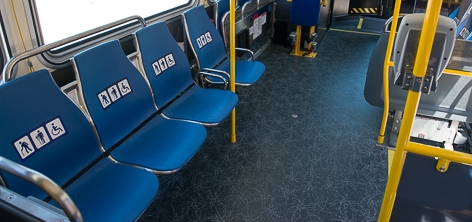
Priority seating for seniors and customers with disabilities is located immediately behind the train Operator’s compartment at both ends of the car. The priority seating includes the first rows of aisle-facing seats, which flip up to accommodate a wheelchair, and the first rows of forward-facing seats.
Please Note:
On crowded trains, the priority seats may already be occupied by seniors and people with disabilities or by other customers. Upon request, operators can ask passengers to give up their seats, but cannot force them to do so.
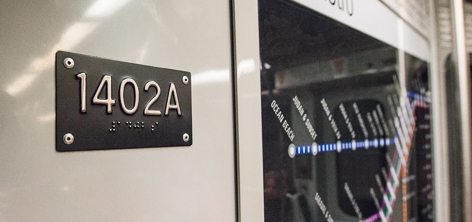
All vehicles have a vehicle identification number plate at each end that includes four digits plus the letter A or B to denote the end of the vehicle. The signs are located approximately 60" from the floor on the flat panel behind the Operator’s compartment and include raised characters and braille. Customers must provide the vehicle number in order to report problems with equipment or service.
Vehicles are equipped with push button-activated intercoms, to be used in case of emergency, which allow customers to communicate with the train Operator. The intercoms are located next to the door behind the Operator’s compartment at each end of the car.
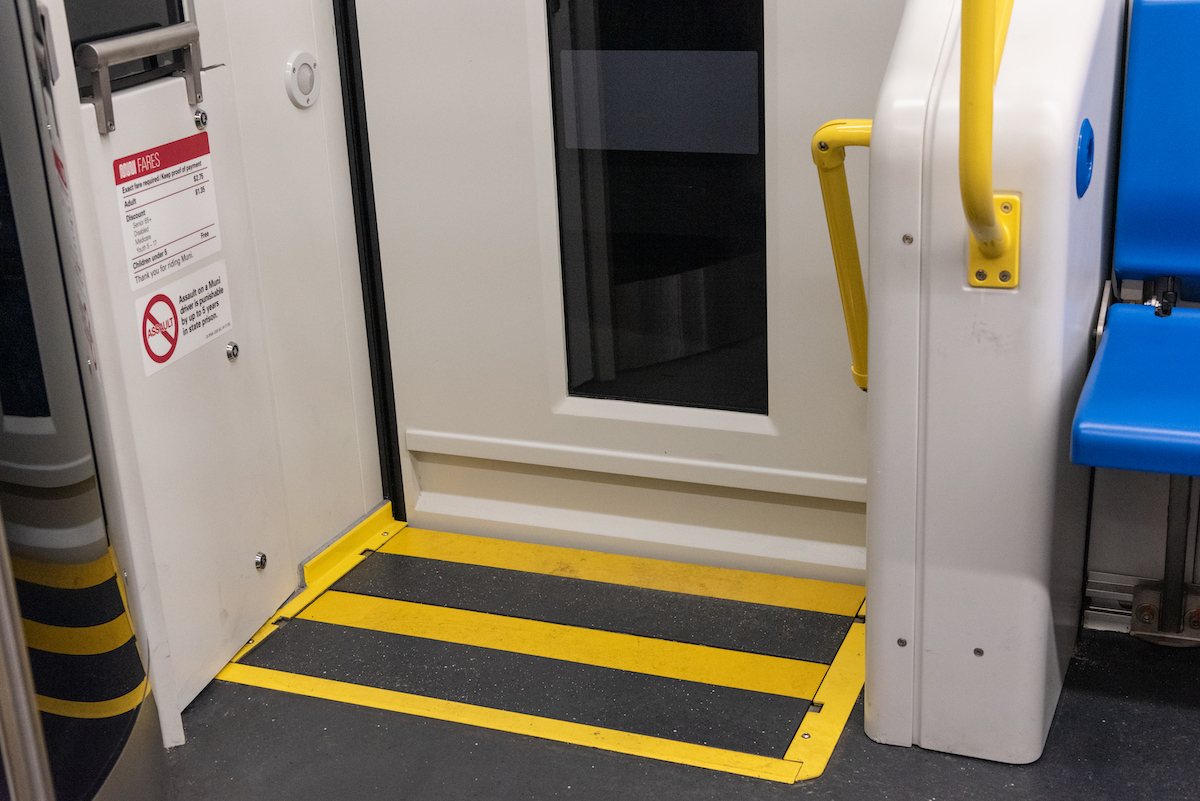

The stairwells on all of our LRVs can be raised or lowered. For street level stops on the surface, these steps are kept in the lowered position. For stops at high level platforms the stairs are raised. A bell sounds when the steps are lowering to warn passengers to move away from the doors. At high level platforms, step extensions, which deploy automatically when the doors are opened, are used to reduce the gap between the LRV floor and the station platform.
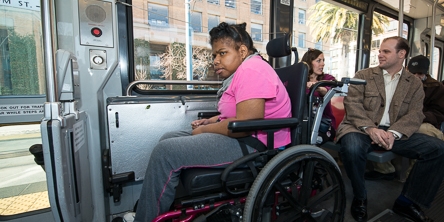
Each LRV is equipped with four flip-up seating areas near the front and rear of the train car. These seats can be flipped up to accommodate most mobility devices. If you are concerned about whether your mobility device can be accommodated, please contact SFMTA Accessible Services (415.646.2260).
Segways
Muni may be able to accommodate a Segway, when used as a mobility device. You will need a Permit. For more information on Segway accommodations, please call or contact Matthew West (415) 646-2753, or Matthew.West@SFMTA.com.
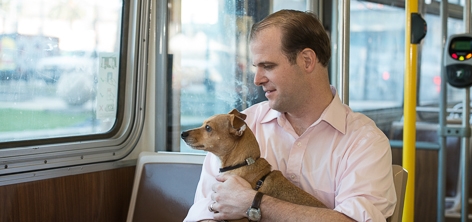
Service Animals are allowed on the Muni Metro. Service animals must be leashed and under the control of their owner at all times.
More Information:
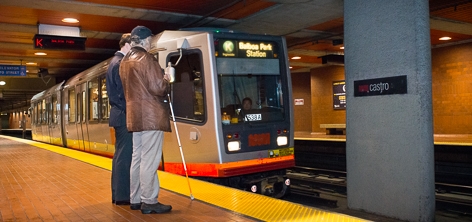
The Muni Metro stations from West Portal to The Embarcadero are underground. The downtown subway stations (between Civic Center and The Embarcadero) are shared by Muni and the Bay Area Rapid Transit District (BART). These stations are multi-level, with a concourse level, a Muni boarding platform at mid-level and a BART platform at the lowest level. Downtown stations are identified by distinctive print signs and braille signs.
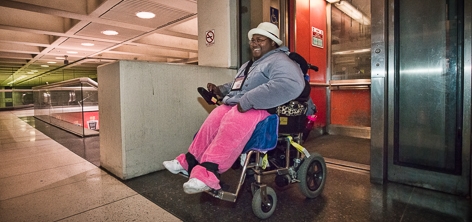
All underground stations are accessible by elevator. The street level elevators at each station are located on the north side of Market Street near a station entrance and are marked by a sign. The street elevator will take you to the concourse level, where signs are posted to direct you to the platform elevator. At the concourse level of the shared downtown stations, Muni and BART have separate and distinct station agent booths and faregate arrays. A shared elevator provides access from the concourse to both the Muni and BART platform levels. For information on elevator status, please call the San Francisco Customer Service Center at 311 (415.701.2311 outside of San Francisco). You may also contact BART’s elevator information line at 510.834.LIFT (510.834.5438) or 888.235.3828. Elevator alerts can be texted to your phone by signing up for "Watch Route Alerts" and choosing to receive alerts for either the J, K, L, M, N or T Lines (text message rates apply).
More Information:
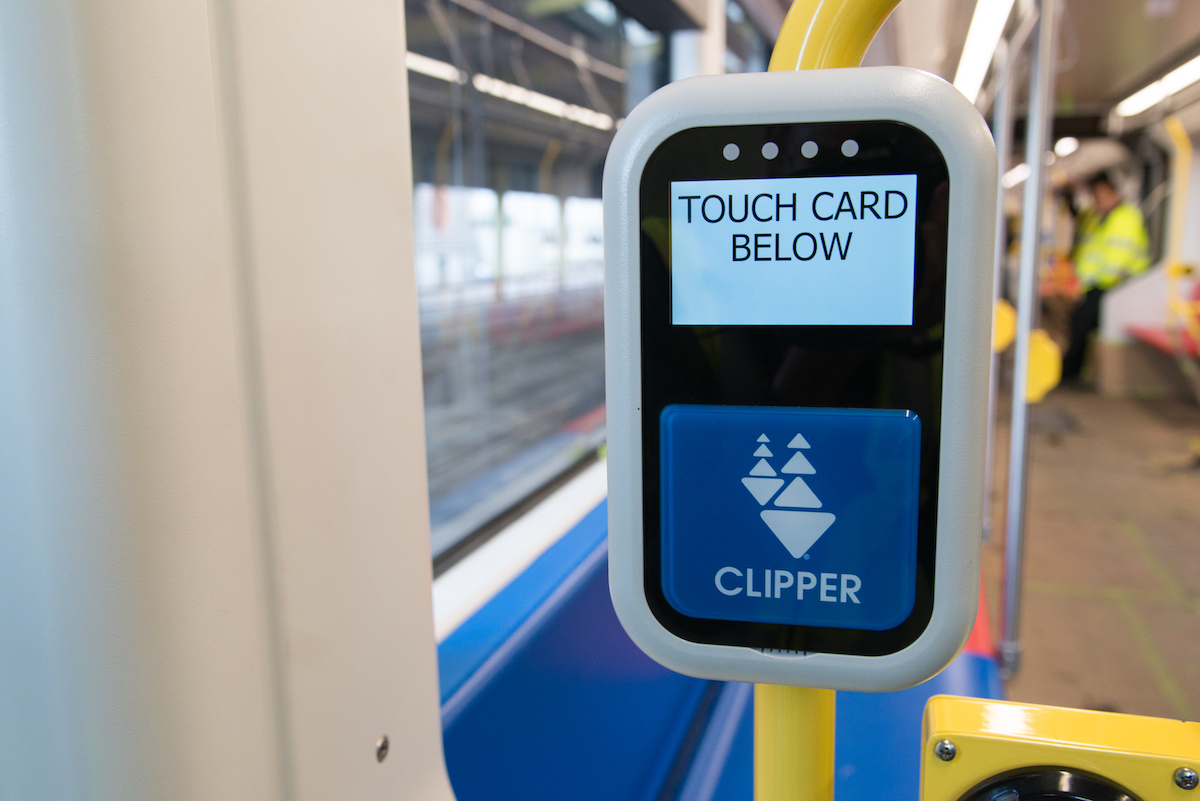
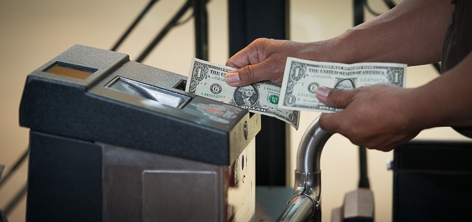
You must pay your fare prior to boarding the elevator to the platform. Passengers are encouraged to pay with a Clipper Card by tagging the card at the Clipper reader near the elevator to the platform. Passengers who are eligible to pay a discounted fare but do not have a Clipper Card or transfer must purchase a ticket from a ticket vending machine near the station agent booth. The ticket must be tagged at the Clipper reader on the concourse level near the elevator in order to serve as valid proof of payment.
More Information:
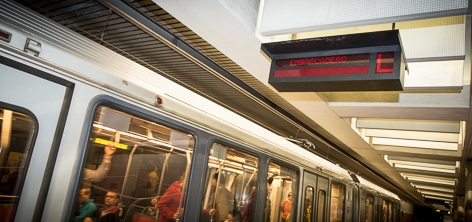
Once on the Muni platform of a shared station, signs will direct you to the inbound or outbound side. Look for the red “boarding area” signs on the trackside walls (opposite the platform waiting area) that indicate where to wait for a train. On the platform, overhead digital signs display the line name and destination of the train that is boarding as well as the next train pulling into the station. A recorded voice also announces the predicted arrival time of the next three trains in the subway. Metro maps are installed on the trackside walls and tactile maps of the entire Muni system are located on the subway platforms at the inbound and outbound boarding areas.
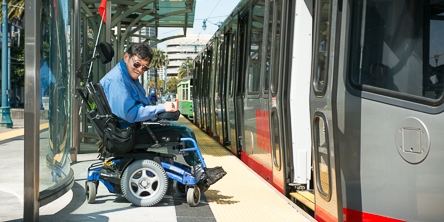
Accessible stops for wheelchairs and other mobility devices are located at regular intervals and at major destinations such as schools and hospitals. Accessible surface stops are generally low-level island stops with a ramp up to a small high-level platform for those who need level boarding.
On the T Line all surface stops are wheelchair accessible, with high platforms that provide level boarding at all doors. There are ramps at one or both ends of these platforms. On the M Line, the platforms at Stonestown and San Francisco State are also high-level platforms.
More Information:
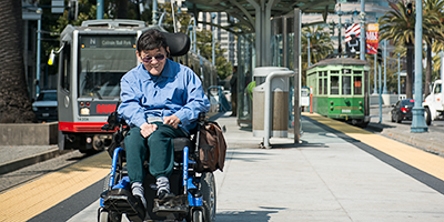
To board from an accessible island stop, wait for your train on the high platform. When the train arrives, the Operator will raise the interior stairs and position the vehicle so that you can board at the first door. Let the Operator know your destination stop as soon as you board and whether you need help with the jump seats at a stationing area. Wheelchair users should then proceed to the wheelchair stationing area, which is created by flipping up one of the first sets of aisle-facing seats next to the door.
Note:
When traveling from downtown to a street level destination on the J, K, L, M or N lines you MUST board the first door of the first car of the train. Be sure to let the Operator know your destination in advance so that they can properly position the train at the accessible platform.
Boarding at San Jose and Geneva Ave.
On the M Line, the accessible stop at San Jose and Geneva avenues has a mechanical wayside lift that elevates customers to the level of the train floor for boarding and exiting. The lift is separated from the boarding island by a gate, and remains in the lowered position when not in use. To use the lift, go through the gate and wait for a train on the lift platform. Locate the control button (on your left when facing the train). When the LRV arrives, push and hold the “up” button to raise the lift. Press the button continuously or the lift will stop. If you are unable to press and hold the button, the train Operator can raise and lower the lift from inside the train. Note that the lift will not operate until the train stops next to the platform.
Note:
When traveling from downtown to a street level destination on the J, K, L, M or N lines you MUST board the first door of the first car of the train. Be sure to let the Operator know your destination in advance so that they can properly position the train at the accessible platform.
Our lifts can lift up to 600 pounds. The securement area is limited by dimension. If you are concerned about whether your mobility device can be accommodated, please contact SFMTA Accessible Services (415.646.2260).
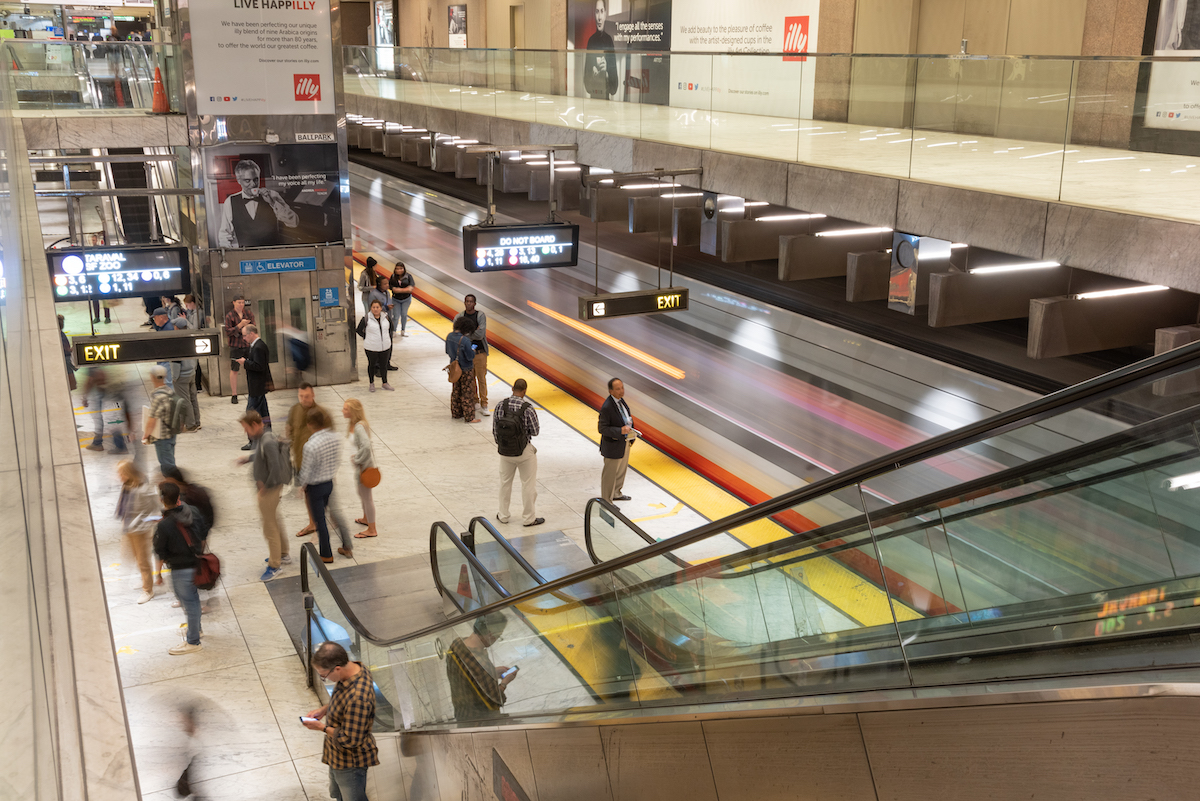
All underground station entrances are easily identified by sidewalk signage. They also have Braille station name signs, often on the right-hand side of the stairwell. All subway stations are accessible by elevator, escalator or stairs and comprise of two levels, a concourse and a platform level. An accessible fare gate is available for use and is located immediately adjacent to the station agent booth.
Yellow tactile tile is provided on the platform level to indicate the edge of the boarding platform; please stand behind the tactile tile at all times while on the boarding platform.
Stations are either center platform (tracks on either side) or side platform (two platforms with tracks in between).
Center Platform Locations
Side Platform Locations
Automated Announcements
In the underground stations (Embarcadero, Montgomery, Powell, Civic Center, Van Ness, Church, Castro, Forest Hill and West Portal), a digital voice announcement system announces the route designation and arrival time of approaching and arriving trains. Announcements of upcoming stations are made inside the train.
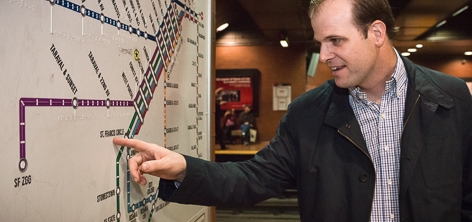
Maps of the Metro system with Braille and raised characters are installed on the concourse and platforms levels of underground stations. Braille and Tactile Maps of certain Muni Metro lines are also available from the San Francisco Lighthouse for the Blind; more information on this program can be found here.
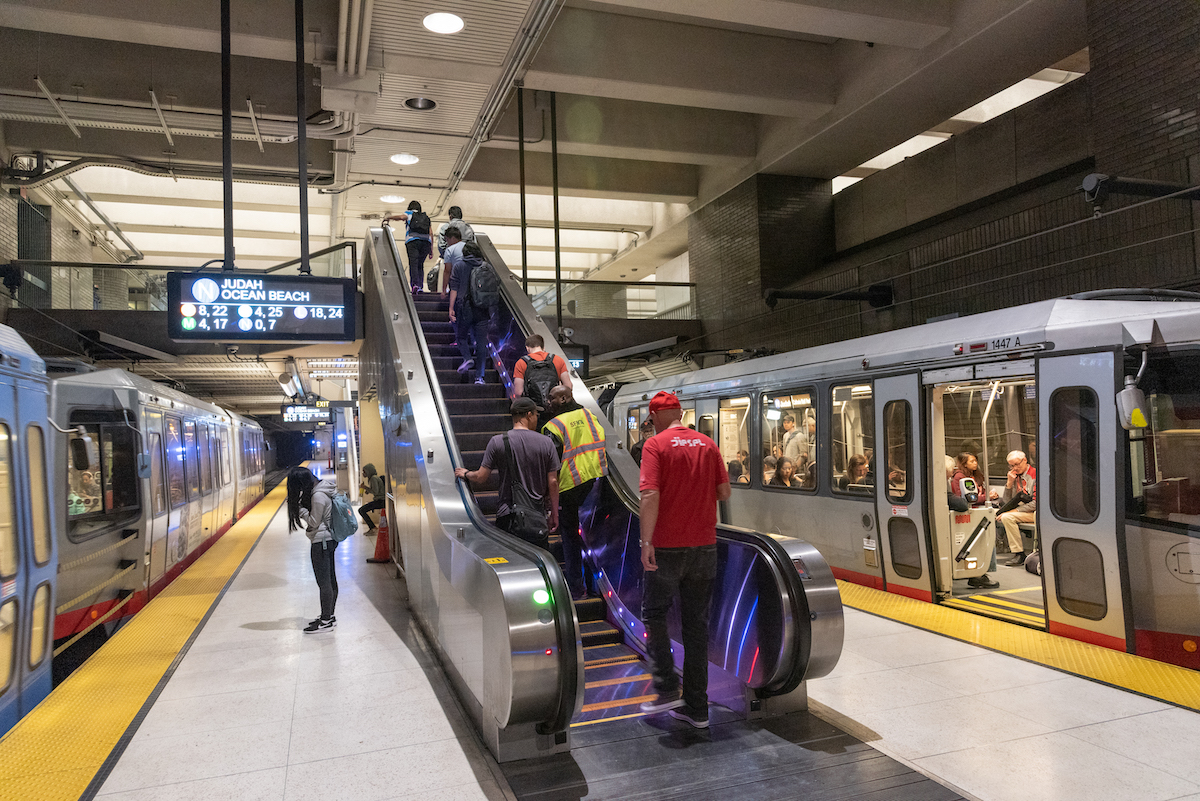
Stair and Escalator Locations
Stairs and/or an escalator are located at each end of every downtown station. Inbound trains stop near the middle of the platform and outbound trains stop at the far end of the outbound platform.

Metro cars are equipped with a chime that sounds in each doorway to help guide people with visual disabilities to the door opening.
Caution:
All light rail vehicles taper or narrow at each end, creating a larger vehicle-to-platform gap. When looking for a doorway, be sure to locate the floor of the train before stepping off the platform. Do not mistake the gap between the end of a car and the platform for the gap between the platform and the train doorway.
安全是三藩市交通局首要任務,Muni 每天為數千人提供服務,保持安全很重要,并且用友好和尊重的態度對待乘客。 各種基於性別和種族的騷擾、攻擊和性暴力,在三藩市交通局工作網路中都嚴格禁止,包括在車輛上、車站以及設施内。威脅、傷害或騷擾乘客以及三藩市交通局員工都屬非法,不會被容忍。 在該頁面: 良好行為准則 報告 Muni 的罪案 結束騷擾 其他規則及規例 避免在Muni被盜 深夜車站 安全使用...
As part of Muni Forward, SFMTA has identified the 5 Fulton corridor as being a part of its proposed Rapid Network. In most cities, a Rapid Network is bus service with dedicated lanes and vehicles that allows transit to move swiftly on the street. With our Rapid Network, we intend to build transit priority lanes with efficient stop spacing to move buses quickly along their routes. We’ll also create better boarding zones to make it safer and faster for passengers to get on board, and make it easier to find our bus stops and shelters with improved signage.
The 5 Fulton route carries about 19,000 daily customers on an average weekday. The route’s study corridor is 5.6 miles long and includes Fulton Street between La Playa and Central Avenue, Central Avenue between Fulton and McAllister streets, and McAllister Street between Central Avenue and Market Street. Within the study area, the 5 Fulton operates at an average speed of 9.7 miles per hour during peak periods. In order to reduce transit travel times and improve reliability within its proposed Rapid Network, the SFMTA proposes a toolkit of measures within the study area.
To reduce travel times and enhance reliability on the routes that make up its proposed Rapid Network, Muni Forward has identified a variety of Travel Time Reduction Proposals (TTRPs), which are engineering strategies oriented to specifically address the delays vehicles face along rapid routes. As a part of the proposed Rapid Network, the 5 Fulton has its own toolkit of TTRPs, which specifically target the evaluated causes of delays within the 5 Fulton corridor. The proposal includes:
Thanks to the almost 1,600 respondents who gave us feedback on design details for the new trees and decorative sidewalks that will be a part of the Geary Boulevard Improvement Project. We have completed analyzing all feedback and have used it to decide on tree species and sidewalk design themes. Read more in the Community Enhancement Outreach Round 2 survey results report.
Outreach to finalize the locations and tree species for new street trees along Geary Boulevard has begun. If you live, work, or own property next to one of the proposed tree locations, you will be receiving a letter inviting your input.
The Geary Boulevard Improvement Project will include a community enhancement element to beautify the corridor. The community enhancement has been determined based on community feedback and will include about fifty new street trees and decorative glass aggregate sidewalk designs at some Rapid bus stops.
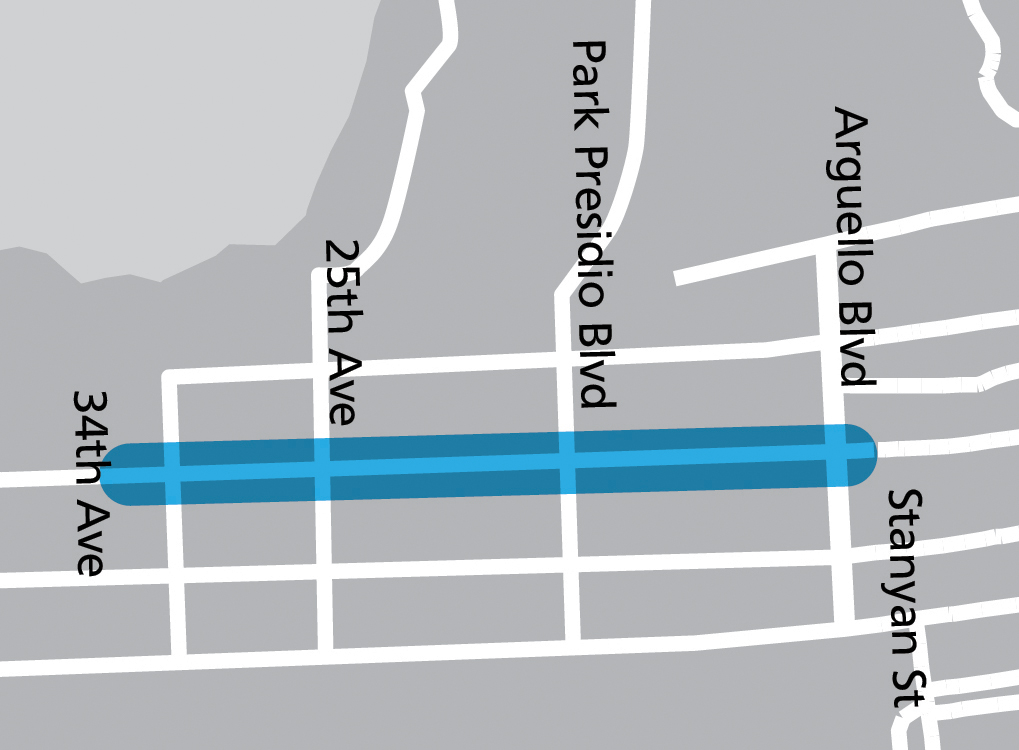
Map of Geary Boulevard Improvement Project limits and area where community enhancement treatments will be installed
Decorative concrete with glass aggregate sidewalk designs will be installed at six Rapid bus stops (Park Presidio inbound and outbound, 20th Avenue inbound and outbound, and 25th Avenue inbound and outbound). Designs will feature the nature of the Richmond District. Outbound bus stops will have ocean-themed decorative sidewalks, while inbound bus stops will have greenery/park-themed sidewalks. The SFMTA will seek to partner with local students to develop the sidewalk designs (potentially via partnership with a George Washington High School art class). Community feedback provided on preferred design themes will be considered for each location, including native flora and fauna.
The glass aggregate material will meet all appliable specifications for slip resistance, maintenance and safety. It will be sealed and able to withstand impacts, and if any aggregate does come loose eventually, the edges will not be sharp and a maintenance crew can easily sweep it up before repairs.
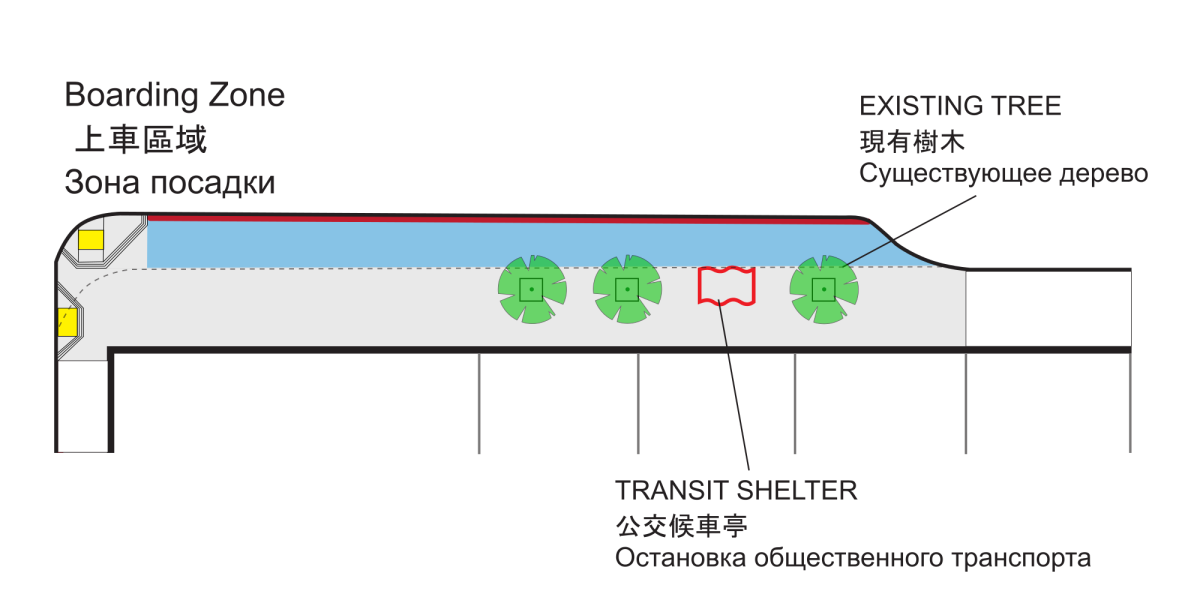
Decorative sidewalk designs will be located within the bus stop boarding zone.
About 50 trees will be planted both in the median and on the sidewalk, using the following tree species:
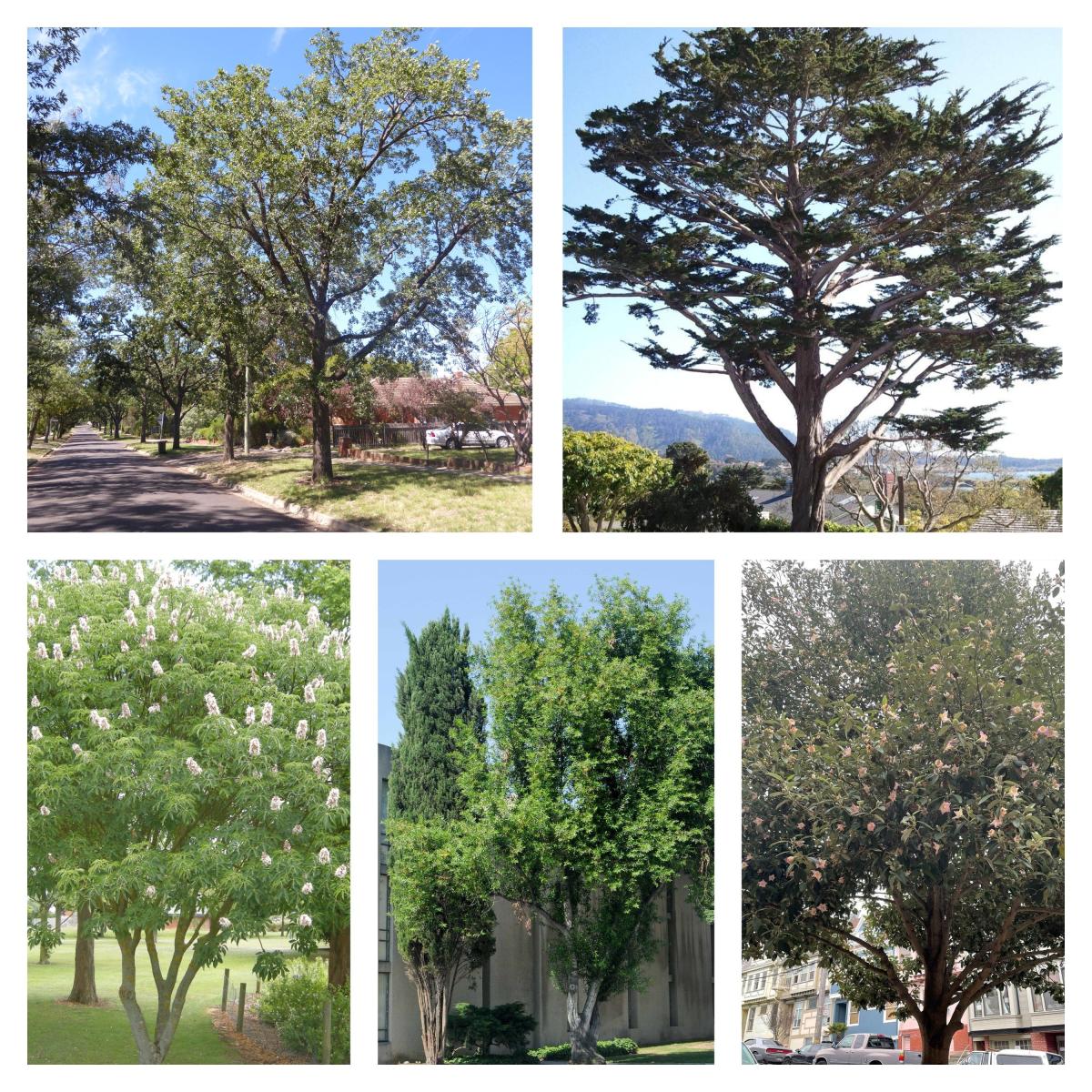
Top row (for median planting): Coast Live Oak (Querces agrifolia) and Monterey Cypress (Cupressus macrocarpa).
Bottom row (for sidewalk planting): California Buckeye (Aesculus californica), California Bay Laurel (Umbellularia californica) and Primrose Tree (Lagunaria patersonia).
We will be selecting the individual locations for trees in the coming months. All locations must meet accessibility and utility clearance requirements. We also will try to minimize any visual impedance of storefront signage. Outreach will be done to adjacent properties prior to finalizing sidewalk locations.
Outreach
The project’s community enhancement has been guided by two rounds of outreach:
Next steps
These selected enhancements will be constructed along with other transit and safety improvements in late 2026 and 2027, following SFPUC’s underground utility work.
Have questions? Contact us at:
ImproveGeary@SFMTA.com
415.646.2300
Muni服務公平策略是該機構致力於讓所有乘客都能利用和負擔得起公共運輸的重要承諾的組成部分。 透過實施可快速實施的服務處理措施,同時實現重要的安全改善措施,連結主要目標、可靠性、頻率和擁擠程度,公平策略將使8個選定的公平鄰舍,長者和殘疾人士受益。此外,該策略將為服務每個公平鄰舍的Muni路線建立一個績效基準,並會每年進行監測。
三藩騎行與滑行計劃 是一項為期兩年的規劃程序,用來為三藩市的積極移動性制定一個新計劃。該新計劃指導三藩市交通局未來10至15年在積極交通網絡、支援設施、各項計劃和政策上的投資。這項新的規劃工作包含所有可合法使用積極交通網絡的裝置,以及加大公平優先社區的聲量與需求。 這項計劃對三藩市而言正逢其,因為自從上一個2009年自行車總方案通過以來已有許多改變。零死亡道路安全計劃(Vision Zero...
現可在 MuniMobile® 買日票証 ( Day Pass) 。只是五元,這是很好的價錢。在 MuniMobile 程式上找 " 日票証 ( 不適用於纜車 cable car)" ; 可無限次數乘搭 Muni 巴士, 火車和有 歷史性的街車。以一個很低的價錢, 你可以整天乘搭 Muni 。由早上返工到晚上 看壘球比賽都可以用這新的日票証,日票証 的有效時間是到晚上 11:59 。 可將...
對一般乘客來說,月票是每月無限次使用Muni服務的最便利方式,電纜車票也包含在內。月票目前只在 Clipper®上提供。 Lifeline(低收入)月票有特殊申請規定, 詳情請參閱Lifeline說明。 CLIPPER是什麼? Clipper卡是一種易用、通用、可充值的卡片,讓您安全便利地繳納灣區公交車費和轉乘。Clipper卡在本市和灣區各地皆可使用,您可搭乘所有Muni車輛、BART、AC...
纜車車票 車費可於上車後付給纜車車掌。請備妥小額紙鈔。纜車不提供免費轉乘服務。如果您從一台纜車下車,必須支付全額車費才能搭乘另一台纜車。若是全日乘坐,可以考慮購買 遊客通行證。 單次乘坐 MuniMobile:成人和青少年 Clipper卡/App:成人和青少年 現金 年長者 /殘障人士/Medicare持有人:晚上9點至早上7點 如果一次購買五張或以上紙質電纜卡門票, 您現在可以在線購買。...
Muni的單次搭乘車費可乘坐公交車120分鐘,搭乘單一路線或是在公車與輕軌車之間多次轉乘皆可。用Clipper®卡或 MuniMobile支付車費,每趟乘車可節省$0.25。 有關折扣票價的資訊,請參閱 青少年/年長者/殘障人士折扣。 居民則可考慮購買經濟實惠的 折扣月票。 未來票價變更。 用CLIPPER®付款 您可以將現金充值到Clipper卡,支付單次搭乘車費...
鑒於2024年3月16日發生了造成4名行人死亡的悲慘事件,第7區参事梅義加 (Myrna Melgar)和London Breed市長已要求三藩市交通局 (SFMTA) 改善West Portal站附近的交通安全。 West Portal 站是三藩市交通系統的關鍵連接點。 三條鐵路線和兩條巴士路線每天為50,000名乘客提供服務,在West Portal Avenue和Ulloa...
Muni Operators Benefits
Application Window
Sign Up for Job Alerts
Requirements
Important Information About Licensing
Frequently Asked Questions
Jump-start your career in transportation -- become a Muni Operator. Whether you're driving Muni's fleet of buses, trains, historic streetcars or world-famous cable cars, as a Muni Operator you're playing an important role in San Francisco. Interested in a job with excellent benefits, great compensation and a sense of civic pride?
SFMTA will provide further outreach regarding steps for pre-employment at that time.
Sept/Oct 2024 (T00117) Applicants
December 2023/January 2024 (T00100) and April 2024 (T00110) Applicants
Interested in the next posting or future postings?
*See the full requirements on the announcement when posted.
More detailed information about the learner's permit is available by reviewing the Become a Muni Operator: Driver’s Record and Commercial Learner's Permit Guide.
More information about this free training program is available on the CityDrive Training Program site.
The Hiring Process Includes:
You can also go to the City's Job FAQ page which provides answers to many frequently asked questions on topics such as:
SFMTA 為在舊金山無家可歸的個人提供各種折扣。可用折扣: 一次性豁免一輛車上的所有開放停車罰單 過境引證豁免 取消對公開引用的所有逾期處罰 連接程序 次性選擇在參與的非營利組織接受服務以代替引文付款 通行證 - 提供免費使用市政車輛的過境通行證 靴子移除費 - 一次性靴子移除費解僱 被拖車費 - 管理費、拖車費和倉儲費取消 SFMTA 還提供 付款計劃 和一個 社區服務...
路邊電動車充電可行性研究和試點計畫是本市為滿足日益增長的電動車需求所做的努力,促進在 2030 年前安裝逾 1,500 個公共充電樁。最終目標是在舊金山多個社區的路邊設置公共電動車充電試點站,並計劃擴展成全市性計畫。